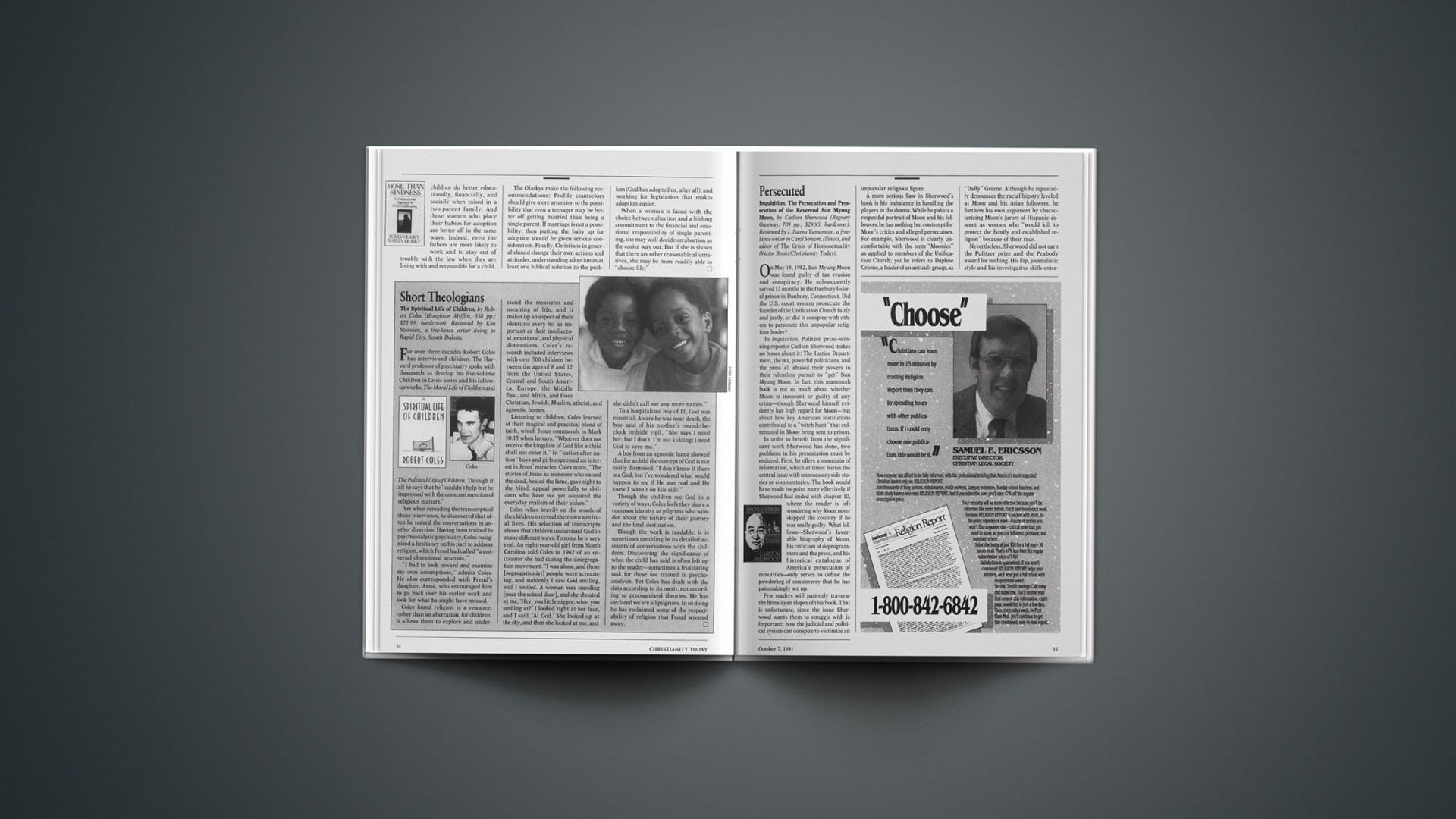The Spiritual Life of Children, by Robert Coles (Houghton Mifflin, 358 pp.; $22.95, hardcover). Reviewed by Ken Steinken, a free-lance writer living in Rapid City, South Dakota.
For over three decades Robert Coles has interviewed children. The Harvard professor of psychiatry spoke with thousands to develop his five-volume Children in Crisis series and his follow-up works, The Moral Life of Children and The Political Life of Children. Through it all he says that he “couldn’t help but be impressed with the constant mention of religious matters.”
Yet when rereading the transcripts of those interviews, he discovered that often he turned the conversations in another direction. Having been trained in psychoanalytic psychiatry, Coles recognized a hesitancy on his part to address religion, which Freud had called “a universal obsessional neurosis.”
“I had to look inward and examine my own assumptions,” admits Coles. He also corresponded with Freud’s daughter, Anna, who encouraged him to go back over his earlier work and look for what he might have missed.
Coles found religion is a resource, rather than an aberration, for children. It allows them to explore and understand the mysteries and meaning of life, and it makes up an aspect of their identities every bit as important as their intellectual, emotional, and physical dimensions. Coles’s research included interviews with over 500 children between the ages of 8 and 12 from the United States, Central and South America, Europe, the Middle East, and Africa, and from Christian, Jewish, Muslim, atheist, and agnostic homes.
Listening to children, Coles learned of their magical and practical blend of faith, which Jesus commends in Mark 10:15 when he says, “Whoever does not receive the kingdom of God like a child shall not enter it.” In “nation after nation” boys and girls expressed an interest in Jesus’ miracles. Coles notes, “The stories of Jesus as someone who raised the dead, healed the lame, gave sight to the blind, appeal powerfully to children who have not yet acquired the everyday realism of their elders.”
Coles relies heavily on the words of the children to reveal their own spiritual lives. His selection of transcripts shows that children understand God in many different ways. To some he is very real. An eight-year-old girl from North Carolina told Coles in 1962 of an encounter she had during the desegregation movement. “I was alone, and those [segregationist] people were screaming, and suddenly I saw God smiling, and I smiled. A woman was standing [near the school door], and she shouted at me, ‘Hey, you little nigger, what you smiling at?’ I looked right at her face, and I said, ‘At God.’ She looked up at the sky, and then she looked at me, and she didn’t call me any more names.”
To a hospitalized boy of 11, God was essential. Aware he was near death, the boy said of his mother’s round-the-clock bedside vigil, “She says I need her; but I don’t. I’m not kidding! I need God to save me.”
A boy from an agnostic home showed that for a child the concept of God is not easily dismissed. “I don’t know if there is a God, but I’ve wondered what would happen to me if He was real and He knew I wasn’t on His side.”
Though the children see God in a variety of ways, Coles feels they share a common identity as pilgrims who wonder about the nature of their journey and the final destination.
Though the work is readable, it is sometimes rambling in its detailed accounts of conversations with the children. Discovering the significance of what the child has said is often left up to the reader—sometimes a frustrating task for those not trained in psychoanalysis. Yet Coles has dealt with the data according to its merit, not according to preconceived theories. He has declared we are all pilgrims. In so doing he has reclaimed some of the respectability of religion that Freud wrested away.










